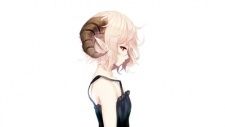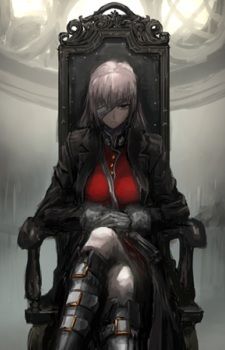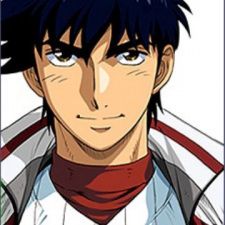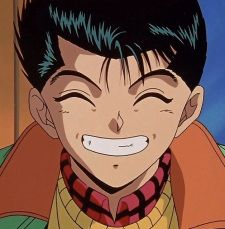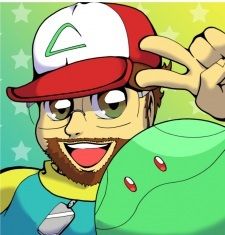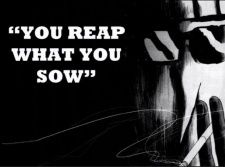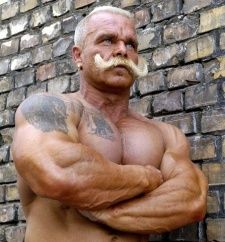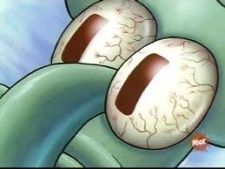✳️ This review will be written in both English and Portuguese (PT-BR) - Essa crítica será escrita em inglês e português (PT-BR)✳️ 𓐚𓐚𓐚𓐚𓐚𓐚𓐚𓐚𓐚𓐚𓐚𓐚𓐚𓐚𓐚𓐚𓐚𓐚𓐚𓐚𓐚𓐚𓐚𓐚𓐚𓐚𓐚𓐚𓐚𓐚𓐚𓐚𓐚𓐚𓐚𓐚𓐚𓐚𓐚𓐚𓐚𓐚𓐚𓐚𓐚𓐚𓐚𓐚𓐚𓐚𓐚𓐚𓐚𓐚𓐚𓐚𓐚𓐚𓐚𓐚𓐚𓐚𓐚𓐚𓐚𓐚𓐚𓐚𓐚 🇺🇸 🔶"The monster in 'Monster' isn't as monstrous as it seems" My experience with Monster was quite interesting, to say the least. Initially, I must confess that the size of the manga made me a bit lazy to start reading the work, which delayed me from picking up the manga and reading it from cover to cover. However, after overcoming this barrier, I was immersed in a story rich in philosophical reflections on life, morality, and human nature. But despite everything, the monster in "Monster" wasn'tas monstrous in the end.
🔶The Value of Life
The manga begins with the introduction of the main character, Dr. Kenzo Tenma, a young and talented neurosurgeon who works at a hospital in Düsseldorf, Germany. Tenma is faced with a difficult choice when two patients need emergency surgery: the city mayor and a boy named Johan. He chooses to save the boy's life, ignoring his superior's orders and the hospital hierarchy. However, this decision ends up changing his life forever.
Personally, I consider Monster a classic of the industry, not only because of its impact within the market, but also because of all the social and philosophical weight that this work carries with it. And why is Monster so special? Well, I believe that this work goes far beyond what is expected of a manga. Not that one necessarily expects a shallow plot in a manga, but it is undeniable that there is a lot of garbage within this market, as in any other. Monster is not just the story of a doctor who decides to save a boy's life and ends up getting involved in a dark plot of conspiracies, murderers, and the search for a "monster". It is also a story about human complexity, the nature of justice, and the consequences and impacts of our own actions on the world.
The philosophical merit of Monster becomes clear from the beginning of the plot, with a question as nuanced as "What is the value of life?". This is the dilemma that Tenma finds himself confronted with early in the story, when he is forced to prioritize the life of one person over another. This conflict goes against his personal and even professional convictions, as a doctor whose priority is always to save the life of whoever arrived first. In such cases, it is common for people to prioritize saving the lives they consider more valuable or important, such as children, the elderly, community leaders, or people with valuable skills to society. But who has the right to decide who is more important and who deserves to live? This is the question that the work proposes to its readers (or at least it should propose).
For Tenma, the value of life is intrinsically linked to his oath as a doctor, which obliges him to protect life at any cost. Making any kind of analysis regarding Tenma's character is difficult because he is a highly idealized character, almost like a Jesus Christ. However, this does not diminish the impact of the work in exploring the complexity of human nature, especially in relation to the question of the value of life.
This view of the value of life is presented in contrast to Johan Liebert's perspective, which represents the opposite extreme. For Johan, the value of life is insignificant and he acts completely amorphously, without any sense of morality or empathy. The origin of this emptiness is a much-debated theme in the plot. Was he born this way or did he become this way due to the circumstances surrounding him? And is that what really matters? These are some of the reflections that the work proposes, making it a classic of the industry not only for its intriguing narrative, but also for the philosophical depth it presents.
The philosophical reflection on who deserves to live or die is a complex and delicate issue. After all, who are we to judge the value of another person's life? Some may have thought they had the answer to this question, but I don't think that ended very well, did it? Most cultures believe that all lives are equal and that each individual has the fundamental right to live. However, there are circumstances in which people need to make difficult choices, such as in situations of war, natural disasters, or when there is a scarcity of resources. All this subtext reminds me of the classic trolley dilemma: Would you divert the train from its track so that instead of killing a group of 5 people, only 1 would die? And what if that one person was a relative of yours? Clearly, it's not a question that has a correct answer, and that's precisely why this theme is an eternal "hot potato". Various authors can debate it for years on end, and no one will actually find an answer, as it is a very individual decision, which in my view makes the character of Tenma simplistic, and even a bit boring.
For Tenma, the value of life is defined by the legacy of his profession. He thinks that life is the most precious good and must be protected at any cost, as if he were following the Hippocratic Oath to the letter, you know? Due to his indiscriminate dedication to any patient, whether they are a good guy or a bastard, rich or poor, without questioning the real meaning of that value he so clings to.
But the real debate that the manga wants to bring to light is when it puts Tenma's worldview in direct confrontation with Johan's convictions (or lack thereof?). The dichotomy between Tenma and Johan is, in a very superficial way, the clash between good and evil (I really hope you, as a reader, haven't reduced this broad debate to just that). The fundamental difference between these two characters is how they view human life. This theme goes beyond the scope of fictional narrative, making it a reflection on human condition itself and the ethical tensions that exist worldwide and accompany us almost daily in our lives. The fact that Tenma is forced to choose between saving one life or another already indicates that ethics is not something that can be determined in advance, but rather something that emerges in encounter with concrete reality, which again, only reinforces my point that Tenma, like Johan, are somewhat shallow characters. And since I've been mentioning this for some time, let's finally talk about the dreaded characters of Monster.
🔶The Unidimensionality of an Unconvincing Character
The construction and development of characters are fundamental aspects in the narrative of any work, whether literary, cinematographic, or in other forms of media. The success of a character lies not only in their appearance or the active actions they commit throughout the story, but also in their construction, motivations, sense of empathy, and especially in the narrative development throughout the plot. When it comes to Tenma, it is possible to perceive a series of flaws in his construction that make him an objectively poorly developed character.
His motivation is simple: he wants to redeem himself for the mistake he made in saving Johan. However, this mistake is not as well established as it should be, leaving the reader without understanding the true weight it had on the character's life. It is superficially clear that it left him shaken in a way, especially because he feels responsible for saving that man who is committing various crimes, but do you realize that this makes no sense with the persona presented so far? Tenma has always been portrayed as an altruistic man, who saves lives, regardless of whose life it is, and because of actions taken by this saved life, he simply thinks he has the right to take it now? I understand that there are his motivations for being a fugitive, wanting to prove his innocence, however, still, his uncontrollable urge to kill Johan, simply because he feels responsible for his "rebirth" doesn't fit with his ideals of "Everyone has the right to life." So does that mean that suddenly his speech became "Everyone has the right to life! But not that one over there" He is bad, sooo bad!", damn, come on. If his goal were to bring Johan to justice, it would be easily understandable, and don't get me wrong, I'm not saying that Tenma needs to be a one-dimensional character, and go to the grave with his opinions and values, they can and should change throughout his life, but this construction of change did not occur naturally, so it didn't convince me.
In the end, I know this is not a popular opinion, but it's what I observed throughout my reading, and of course, it's not any absolute truth (just like nothing in life).
🔶The Importance of Geography in Monster
One of the main political aspects that the manga addresses is the fall of the Berlin Wall and the end of the Soviet Union. The fall of ]the Berlin Wall is one of the most significant events of the late 20th century, and the way the manga approaches this event is quite interesting, to say the least. Here we see the evolution of post-wall Germany, with the growth of the economy and the emergence of new work and business opportunities. But (there's always a "but"), the manga also portrays the problems faced by German society, such as xenophobia and discrimination against immigrants and refugees (just like today, there is great discrimination against immigrants in France, for example). The manga talks a bit about the conflict between the two Germanys, which became clear after reunification in 1990. At the time the story takes place, Germany was still divided, and tensions between the two parts were quite high. The manga shows the impact that this division had on German society, especially regarding immigrants and refugees.
Immigration was (and still is) a controversial issue, especially in Germany during the 1980s and 1990s. With the growth of the German economy, the country needed labor for various sectors (which reminds me a lot of present-day Japan). This led to the arrival of many immigrants, mainly Turks. Urasawa shows how German society dealt with this wave of immigration, portraying both intolerance and xenophobia, as well as immigrants' struggle for their rights and integration into German society. I don't know to what extent this portrayal was not somewhat exaggerated. Not that I am a great connoisseur of this historical moment, but the fact is that neither I nor Urasawa lived in Germany at the time of the fall of the wall, so any opinion I give, and that Monster presents, are mere opinions based on what we have read from those who actually studied or experienced this event... but who needs historical accuracy when you can have an old orphanage conducting psychological experiments on children to build an "ideal citizen"? I'm talking about the 511 Kinderheim, an orphanage that conducted various experiments on children to create a "perfect man". And this idea is not so absurd after all; there are indeed real cases of "re-education" in children and young people to fit what society expects of its "citizens". And don't think that this is so far from our reality, or have you not noticed that the Brazilian education system was also built with the intention of creating good workers? I won't delve so deep into this subject, go study on your own!
The manga also presents some pretty cool social and political nuances. From the aforementioned Turkish immigration to the Cold War and refugees escaping their home countries to live in peace. The conflict between the neo-Nazi organization and the Turkish immigrant community is a clear example of the tensions that still existed in German society.
Anyway, it's impressive how a suspense and horror manga can be so immersive and at the same time teach us something about the history and geography of a country. Even with its absurd ideas and dark themes, Monster is a worthwhile read for those who want to learn a little more about German history (even if the data there is not the most reliable on earth).
🔶The Monster in "Monster" Isn't That Monstrous After All
This work is considered by many to be a masterpiece of the psychological suspense and horror genre. And undoubtedly, one of the great strengths of the work is its villain, Johan. However, I argue that, despite all the fame, Johan is not as well-written as many claim.
My problem with Johan is that he is almost always portrayed as an almost divine figure, with abilities and knowledge beyond human possibility, you know? This can be interesting in certain types of scripts, but here it ends up distancing the character from the reality of the story, making him less impactful and less interesting than he could be. This aspect, of him always being portrayed as a supernatural being, with intelligence and abilities that seem almost magical, and how he is able to manipulate people with extreme ease, even when they know they are being manipulated, or how he can predict and control the movements of other people, sort of like a master of a human chess game, simply pulls me away from the work because it ends up quite out of tune with what is presented in the manga. The author makes it clear that that story is set in the real world, obeying the rules we know in our reality, but there is a forced aspect to Johan's actions. Like how he manages to manipulate Roberto to the point where the guy gives up his own life and becomes a mass murderer without very well-established motives or objectives, you know? Did cases like this exist in reality? Of course they did, there were sects that did things as bad as that, but here it is not explained how this process happened, you know? How does Johan manipulate people in such a way? Does he use people's political passions for this, like a certain mustached man did in the past? I don't know because the manga doesn't show us!
There is a saying that goes "show, don't tell," and I think this manga has a lot of this problem, it talks a lot, but shows little. I don't want to know how cruel and manipulative Johan is coming from other characters' mouths; I want to see that, I want to "feel" his persuasion process, but that's not what I saw, so I'm not convinced (sorry, had to rhyme). Although this ability is impressive at first glance, it ends up harming Johan's character. He doesn't seem like a realistic character but rather an artificial construction created to be a kind of archetypal villain, an archetype that has been widely used in the history of cinema, literature, and even manga, and that may be interesting in some contexts, but here it seems artificial and forced.
A realistic character is one who has a clear and understandable motivation, who acts according to that motivation, and who has a consistent character arc, but the problem with Johan is that his motivation is often obscure and poorly explained. Although we know he is a sociopath, the depth and complexity of his motivations are never fully explored. We could say that his motivation was to "completely erase his existence from the face of the earth," not only by committing suicide but also by taking everyone who remembers him along, thus sort of definitively erasing his existence, without memories, without a physical body, nothing. But between us, what a shitty motivation, no more.
🔶Urasawa is a Sacred Monster
Monster is one of the pinnacles of sequential art, showcasing impressive technical skill in all visual aspects. Its style is rich in detail, with clear and precise lines, and it employs a lot of light and shadow contrast, which enhances the depth of the characters and scenes. The textures used for materials also bring a strong sense of "groundedness," something easily relatable to reality, so to speak. His use of shadows is also commendable, always well-applied, bringing weight to the scenes when necessary, especially in the final panels of this manga, it's truly eye-catching.
Regarding character design, the work presents a wide variety of characters that are easily distinguishable from each other. I find it remarkable the ability to convey important information about the characters through their appearance, something that few manga manage to do well, by the way. Let's take Tenma as an example; he is depicted as a tall, slender man with black hair, common characteristics of a classic manga protagonist. However, his somewhat hunched posture and introspective gaze create a sense of emotional weight that is rarer in this type of character, making him more complex and realistic.
Another interesting point to mention is the ability to construct good scenarios here; the balance between the amount of detail and simplicity in presentation is the key to success. Here, Urasawa manages to create environments with richness of detail without making them excessively complex or confusing because, whether we like it or not, creating a scenery loaded with information is relatively easy (yes, I'm talking about you, Asano), but finding the right balance between creating "layers" for each element in the frame, and the perspective and framing to convey the sensation of depth and space, that's for a few! And Urasawa uses these techniques, such as overlapping objects, depth planes, and varying camera angles to create a sense of expansiveness in the scenarios. And most importantly, knowing how to create a contrast between the characters and the scenery, this is something that few do well, and here we have a great example of how much this contributes to our immersion in a work.
Anyway, I could spend hours talking about the technical quality of this manga, but that would be stating the obvious... Urasawa is a sacred monster!
🔶Yes, Monster is very good, a timeless classic
Despite its shortcomings, there's no denying that this manga is a "modern classic," and I know, what the hell defines whether a work is a classic or not? Well, for me, impact, longevity, and objective qualities are characteristics that build a classic, and Monster has it all! An impact on the industry, and not just that, but also on comic culture. Longevity, a timeless work that ages like fine wine, where with each reading, it's possible to grasp new messages and interpretations... It's no wonder that here I am, years after its publication, discussing Monster. Objective qualities, such as the construction of a good, well-structured plot, with good pacing, engaging characters, despite their missteps, well... All of this together, and a special touch of "Urasawa," make this manga one of the greats in the manga industry.
𓐚𓐚𓐚𓐚𓐚𓐚𓐚𓐚𓐚𓐚𓐚𓐚𓐚𓐚𓐚𓐚𓐚𓐚𓐚𓐚𓐚𓐚𓐚𓐚𓐚𓐚𓐚𓐚𓐚𓐚𓐚𓐚𓐚𓐚𓐚𓐚𓐚𓐚𓐚𓐚𓐚𓐚𓐚𓐚𓐚𓐚𓐚𓐚𓐚𓐚𓐚𓐚𓐚𓐚𓐚𓐚𓐚𓐚𓐚𓐚𓐚𓐚𓐚𓐚𓐚𓐚𓐚𓐚𓐚
🇧🇷
🔶O monstro em "Monster" não é tão monstruoso assim
A Minha experiência com Monster foi no mínimo interessante. Inicialmente, confesso que o tamanho do mangá me deu um pouco de preguiça de começar a ler a obra, o que me fez demorar a pegar o mangá e ler de cabo a rabo. Entretanto, após vencer essa barreira, fui imerso em uma história rica em reflexões filosóficas sobre a vida, a moralidade e a natureza humana. Mas, apesar de tudo, o monstro em “Monster”, no final não era tão monstruoso assim.
🔶O Valor da Vida
O mangá começa com a apresentação do personagem principal, o Dr. Kenzo Tenma, um jovem e talentoso neurocirurgião que trabalha em um hospital em Düsseldorf, na Alemanha. Tenma é confrontado com uma escolha difícil quando dois pacientes precisam de uma cirurgia de emergência: o prefeito da cidade e um menino chamado Johan. Ele escolhe salvar a vida do menino, ignorando as ordens do seu superior e a hierarquia do hospital. No entanto, essa decisão acaba mudando sua vida para sempre.
Eu, particularmente, considero Monster um clássico da indústria, não só devido ao seu impacto dentro desse mercado, mas também por todo o peso social e filosófico que essa obra carrega consigo. E por que Monster é tão especial? Bem, eu acredito que essa obra vai muito além do que se espera de um mangá. Não que se espere necessariamente um enredo raso em um mangá, mas é inegável que existe muito lixo dentro desse mercado, assim como em qualquer outro. Monster não se resume apenas à história de um médico que decide salvar a vida de um garoto e acaba se envolvendo em uma trama obscura de conspirações, assassinos e busca por um "monstro". É também uma história sobre a complexidade humana, a natureza da justiça e as consequências e impactos das nossas próprias ações no mundo.
O mérito filosófico de Monster fica claro desde o começo da trama, com uma pergunta tão cheia de nuances quanto "Qual é o valor da vida?". Esse é o dilema que Tenma se vê confrontado logo no início da história, quando é forçado a priorizar a vida de uma pessoa em detrimento de outra. Esse conflito vai de encontro às suas convicções pessoais e até profissionais, como médico, cuja prioridade é sempre salvar a vida de quem chegou primeiro. Nesses casos, é comum que as pessoas priorizem salvar as vidas que consideram mais valiosas ou importantes, como as de crianças, idosos, líderes comunitários ou pessoas com habilidades valiosas para a sociedade. Mas quem tem o direito de decidir quem é mais importante e quem merece viver? Essa é a pergunta que a obra propõe aos seus leitores (ao menos deveria propor).
Para Tenma, o valor da vida está intrinsecamente ligado ao seu juramento como médico, que o obriga a proteger a vida a qualquer custo. Fazer qualquer tipo de análise referente ao personagem de Tenma é difícil, pois ele é um personagem altamente idealizado, quase como um Jesus Cristo. No entanto, isso não diminui o impacto da obra em explorar a complexidade da natureza humana, especialmente em relação à questão do valor da vida.
Essa visão do valor da vida é apresentada em contraste com a perspectiva de Johan Liebert, que representa o extremo oposto. Para Johan, o valor da vida é insignificante e ele age de forma completamente amorfa, sem qualquer senso de moralidade ou empatia. A origem desse vazio é um tema muito debatido na trama. Será que ele nasceu assim ou se tornou assim devido às circunstâncias que o cercaram? E será isso que de fato importa? Essas são algumas das reflexões que a obra propõe, tornando-a um clássico da indústria não apenas pela sua narrativa intrigante, mas também pela profundidade filosófica que apresenta.
A reflexão filosófica sobre quem merece viver ou morrer é uma questão complexa e delicada. Afinal, quem somos nós para julgar o valor da vida de outra pessoa? Há quem já achou que tinha a resposta para essa pergunta, mas acho que isso não acabou muito bem, não é mesmo? A maioria das culturas acredita que todas as vidas são iguais e que cada indivíduo tem o direito fundamental de viver. No entanto, existem circunstâncias em que as pessoas precisam fazer escolhas difíceis, como em situações de guerra, desastres naturais ou quando há uma escassez de recursos. Todo esse subtexto me faz lembrar do clássico dilema do trilho do trem: Você desviaria o trem de seu trilho, para ao invés de matar um grupo de 5 pessoas, matasse apenas 1? E se essa única pessoa fosse um parente seu? Claramente não é uma questão que tenha uma resposta correta, e é justamente por isso que esse tema é um “pano para manga” eterno. Diversos autores podem debater acerca dele durante anos a fio, e ninguém de fato encontrará uma resposta, pois isso é uma decisão muito individual, o que a meu ver torna o personagem do Tenma simplista, e até mesmo meio chato.
Para Tenma, o valor da vida é definido pelo legado de sua profissão. Ele pensa que a vida é o bem mais precioso e deve ser protegido a qualquer custo, como se estivesse seguindo o Juramento de Hipócrates a ferro e fogo, sabe? Por sua dedicação indiscriminada a qualquer paciente, seja ele um cara bom ou um desgraçado, rico ou pobre, sem questionar sobre o real significado daquele valor que ele tanto se apega.
Mas o verdadeiro debate que o mangá quer trazer à tona é quando ele coloca essa visão de mundo do Tenma em confronto direto com as convicções (ou falta delas?) de Johan. A dicotomia entre Tenma e Johan é, de forma muito superficial, o embate entre o bem e o mal (eu realmente espero que você, como leitor, não tenha resumido esse amplo debate a somente isso). A diferença fundamental entre esses dois personagens é a forma como veem a vida humana. Esse tema extrapola o âmbito da narrativa ficcional, fazendo dele uma reflexão sobre a própria condição humana e as tensões éticas que existem mundo a fora e que nos acompanham quase que diariamente em nossas vidas. Fato é que a relação entre esses dois personagens não se dá apenas na esfera do bem e do mal, mas sim na complexidade que envolve a vida e a morte, a ética e a moral, a culpa e a inocência. Ao colocar em cena esses dois personagens, o Urasawa nos mostra uma reflexão profunda sobre as tensões éticas que perpassam nossa vida cotidiana. De um lado, temos a visão humanista, que defende a vida como um valor supremo e que se baseia em princípios universais de justiça. Do outro lado, temos a visão individualista, que coloca o indivíduo acima de tudo e que não se preocupa com as consequências de suas ações sobre os outros.
Esse mangá nos passa a ideia de que a ética não é algo absoluto, mas sim algo que se constrói no diálogo e na negociação entre diferentes pontos de vista. O fato de Tenma se ver obrigado a escolher entre salvar uma vida ou outra já indica que a ética não é algo que possa ser determinado de antemão, mas sim algo que emerge no encontro com a realidade concreta, o que novamente, só reforça o meu ponto de que Tenma, assim com Johan, são personagens um tanto quanto rasos. E já que estou citando isso há algum tempo, vamos enfim falar sobre os temidos personagens de Monster.
🔶A unidimensionalidade de um personagem inconvincente
A construção e desenvolvimento de personagens é um aspecto fundamental na narrativa de qualquer obra, seja ela literária, cinematográfica ou em outras formas de mídia. O sucesso de um personagem não está somente em sua aparência ou nas ações ativas que comete ao longo da história, mas sim em sua construção, motivações, senso de empatia e principalmente no desenvolvimento narrativo ao longo da trama. Quando se trata do Tenma, é possível perceber uma série de falhas em sua construção que o tornam um personagem objetivamente mal desenvolvido.
Sua motivação é simples: ele deseja redimir-se pelo erro que cometeu ao salvar Johan. Esse erro, no entanto, não é tão bem estabelecido como deveria ser, deixando o leitor sem entender o verdadeiro peso que ele teve na vida do personagem. Fica claro, de forma superficial, que aquilo deixou ele abalado de certa forma, até porque ele se sente responsável por ter salvado aquele homem que está cometendo diversos crimes, mas percebe com isso não faz sentido com a persona apresenta até aqui? Tenma sempre foi apresentado como um homem altruísta, que salva vidas, independente de qual vida seja, e por conta de ações realizadas por essa vida salva, ele simplesmente acha que tem o direito de ceifá-la agora? Eu entendo que existem ali as motivações dele estar foragido, querendo provar sua inocência, porém ainda assim, o ímpeto incontrolável dele de matar Johan, simplesmente porque ele se sente o responsável pelo “renascimento” do mesmo não encaixa com seus ideais de “Todos tem direito a vida”. Quer dizer então que de repente o discurso dele se tornou “Todos tem direito a vida! Mas aquele ali não” Ele é mal, maaaal!”, porra, não fode. Se o objetivo dele fosse levar o Johan a justiça, seria facilmente entendível, e não me entenda errado, não estou dizendo que o Tenma precisa ser um personagem unidimensional, e vai até o túmulo com suas opiniões e valores, eles podem e devem mudar ao longo de sua vida, mas essa construção da mudança não ocorreu de maneira natural, logo, não me convenceu.
No fim, sei que essa não é uma opinião popular, mas foi o que eu observei ao longo da minha leitura, e claro, não é nenhuma verdade absoluta (assim como nada na vida).
🔶A importância da geografia em Monster
Um dos principais aspectos políticos que o mangá aborda é a queda do muro de Berlim e o fim da União Soviética. A queda do muro de Berlim é um dos eventos mais grandiosos do final do século XX, e a forma como o mangá aborda esse acontecimento é bem interessante, no mínimo. Aqui vemos a evolução da Alemanha pós queda do muro, com o crescimento da economia e o surgimento de novas oportunidades de trabalho e negócios. Mas (sempre tem uma “mas”), também são retratados os problemas enfrentados pela sociedade alemã, como a xenofobia e a discriminação contra imigrantes e refugiados (assim como hoje, existe uma grande discriminação com os imigrantes na França, por exemplo). O mangá fala um pouco sobre o conflito entre as duas Alemanhas, que ficou claro após a reunificação em 1990. Na época em que a história se passa, a Alemanha ainda estava dividida, e as tensões entre as duas partes eram bastante elevadas. O mangá mostra o impacto que essa divisão teve sobre a sociedade alemã, especialmente em relação aos imigrantes e refugiados.
A imigração foi (e ainda é) um assunto polêmico, e na Alemanha durante os anos 80 e 90. Com o crescimento da economia alemã, o país precisou de mão de obra para trabalhar em diversos setores (o que me lembra bastante o Japão dos dias atuais). Isso levou à chegada de muitos imigrantes, principalmente turcos. Urasawa mostra como a sociedade alemã lidou com essa onda de imigração, retratando tanto a intolerância e a xenofobia quanto a luta dos imigrantes por seus direitos e sua integração na sociedade alemã. Eu não sei até que ponto essa retratação não foi um tanto quanto exagerada, até. Não que eu seja um grande conhecedor desse momento histórico, mas fato é que nem eu, nem o Urasawa viveu na Alemanha na época da queda do muro, então qualquer opinião que eu dê, e que o mangá de Monster apresenta, são meras opiniões embasadas no que lemos de quem de fato estudou ou vivenciou esse acontecimento..., mas, quem precisa de precisão histórica quando você pode ter um antigo orfanato que realiza experimentos psicológicos em crianças para construir um "cidadão ideal"? Falo do 511 Kinderheim, orfanato que fazia diversas experiências em crianças para criar um “Homem perfeito”. E essa ideia não é algo tão absurdo assim, existem sim casos reais de “reeducação” em crianças e jovens para se adequar a aquilo que a sociedade espera de seus “cidadãos”. E não ache que isso está tão longe da nossa realidade, ou você não notou que o sistema de educação brasileiro também foi construído com o intuito de criar bons operários? Não vou me aprofundar tanto assim nesse assunto, vá estudar por conta própria!
O mangá também apresenta nuances sociais e políticas bem fodas. Desde a imigração turca já citada, até a Guerra Fria e os refugiados que escapavam de seus países de origem para viverem em paz. O conflito entre a organização neonazista e a comunidade de imigrantes turcos é um exemplo claro das tensões que ainda existiam na sociedade alemã.
Enfim, é impressionante como um mangá de suspense e terror pode ser tão imersivo e ao mesmo tempo nos ensinar algo sobre a história e a geografia de um país. Mesmo com suas ideias absurdas e temas sombrios, Monster é uma leitura que vale a pena para quem quer aprender um pouco mais sobre a história alemã (mesmo que os dados ali não sejam os mais confiáveis da terra).
🔶O monstro em “Monster” não é tão monstruoso assim
Essa obra é considerada por muitos uma obra-prima do gênero suspense e terror psicológico. E, sem dúvida, um dos grandes trunfos da obra é o seu vilão, Johan. No entanto, eu defendo que, apesar de toda a fama, Johan não é tão bem escrito quanto muitos falam por aí.
O meu problema com o Johan é que ele quase sempre é retratado como uma figura quase divina, com habilidades e conhecimentos além do humanamente possível, sabe? Isso pode ser interessante em determinados tipos de roteiros, mas aqui acaba afastando o personagem da realidade da história, tornando-o menos impactante e menos interessante do que poderia ser Esse aspecto, dele sempre ser retratado com um ser sobrenatural, com uma inteligência e habilidades que parecem quase mágicas, e de como ele é capaz de manipular pessoas com extrema facilidade, mesmo quando elas sabem que estão sendo manipuladas, ou como ele consegue prever e controlar os movimentos de outras pessoas, meio que como um mestre de um jogo de xadrez humano, simplesmente me afasta da obra, porque isso acaba destoando bastante daquilo que é apresentado no mangá. O autor deixa bem claro que aquela história é passada no mundo real, obedecendo as regras que nós conhecemos em nossa realidade, mas existe uma forçação de barra muito grande quanto aos atos do Johan. Como por exemplo ele conseguir manipular o Roberto a ponto de o cara desistir da própria vida e virar um matador em massa sem motivos ou objetivos muito bem estabelecidos, sabe? Existiram casos assim na realidade? Claro que sim, existiram seitas que fizeram coisas tão ruins quantas, mas aqui não é explicado como esse processo se deu, entende? Como o Johan faz para manipular as pessoas de tal forma? Ele se utiliza das paixões políticas das pessoas para isso, assim com um certo bigodinho fez no passado? Eu não sei, porque o mangá não nos monstra!
Existe um ditado que diz “não fale, mostre”, e acho que esse mangá tem muito desse problema, ele fala muito, mas mostra pouco. Eu não quero saber o quanto o Johan é cruel e manipulador vindo da boca de outros personagens, eu quero ver isso, quero “sentir na pele” seu processo de persuasão, mas não é isso que eu vi, logo não me convenci (perdão, tive que rimar). Embora essa habilidade seja impressionante em um primeiro momento, acaba prejudicando o personagem do Johan. Ele não parece um personagem realista, mas sim uma construção artificial criada para ser uma espécie de vilão arquetípico, arquétipo esse que foi amplamente utilizado na história do cinema, literatura, e até nos mangás, e isso até pode ser interessante em alguns contextos, mas aqui ele parece artificial e forçado.
Um personagem realista é aquele que tem uma motivação clara e compreensível, que age de acordo com essa motivação e que tem um arco de personagem consistente, mas o problema com o Johan é que sua motivação é muitas vezes obscura e mal explicada. Embora saibamos que ele é um sociopata, a profundidade e a complexidade de suas motivações nunca são totalmente exploradas. Podemos dizer que sua motivação era “apagar totalmente sua existência da face da terra”, não só cometendo suicídio, mas levanto todos que se lembram dele junto, assim meio que definitivamente apagando sua existência, sem memorias, sem corpo físico, nada. Mas cá entre nós, que motivação merda, sem mais.
🔶Urasawa é um monstro sagrado
Monster é um dos expoentes da arte sequencial, que apresenta uma habilidade técnica impressionante em todos os aspectos visuais. Seu estilo é repleto de detalhes, tem um traço claro e preciso, com muitos contrastes de luz e sombra, o que aumenta a profundidade dos personagens e das cenas. Aqui as texturas usadas nos materiais também é algo que traz uma sensação de “pé no chão” muito forte, sabe? Algo facilmente relacionável com a realidade, digamos assim. Seu uso de sombras também é algo de tirar o chapéu, sempre muito bem aplicado, trazendo um peso para as cenas quando se faz necessário, principalmente nos requadros finais desse mangá, é algo de encher os olhos.
Sobre o design dos personagens, a obra apresenta uma ampla variedade de personagens que são facilmente distinguíveis uns dos outros. Acho sensacional a capacidade de transmitir informações importantes sobre os personagens por meio de sua aparência, coisa que poucos mangás conseguem fazer bem, diga-se de passagem. Vamos pegar o Tenma como exemplo, ele é retratado como um homem alto, magro e de cabelos pretos, que são características comuns de um protagonista clássico de mangá. No entanto, a sua postura meio curvada e seu olhar introspectivo criam uma sensação de peso emocional que é mais rara nesse tipo de personagem, tornando-o mais complexo e realista.
Outro ponto interessante de falar é a habilidade de construir bons cenários aqui, o equilíbrio entre a quantidade de detalhes e a simplicidade na apresentação é a chave para o sucesso. Aqui, Urasawa consegue criar ambientes com riqueza de detalhes sem torná-los excessivamente complexos ou confusos, porque querendo ou não, fazer um cenário carregado de informações é relativamente fácil (sim, estou falando de você, Asano), mas achar a medida certa entre criar “layers” para cada elemento em quadro, e a perspectiva e os enquadramentos para transmitir a sensação de profundidade e espaço, isso é para poucos! E Urasawa utiliza essas técnicas, como a sobreposição de objetos, planos de profundidade e a variação de ângulos da “câmera” para criar sensação de amplitude dos cenários. E o mais importante, saber criar um contraste entre os personagens e o cenário, isso é algo que poucos fazem bem, e aqui temos um ótimo exemplo do quanto isso contribui para a nossa imersão em uma obra.
Enfim, poderia passar horas falando sobre a qualidade técnica desse mangá, mas séria chover no molhado... Urasawa é um monstro sagrado!
🔶Sim, Monster é muito bom, um clássico atemporal
Apesar dos pesares, não tem como não dizer que esse mangá não é um “clássico moderno”, e eu sei, o que diabos define se uma obra é um clássico ou não? Bom, para mim, impacto, longevidade e qualidades objetivas são características que constroem um clássico, e Monster tem tudo isso! Um impacto na indústria, e não só isso, mas também na cultura dos quadrinhos. Longevidade, uma obra atemporal, que envelhece como vinho, onde a cada leitura, é possível captar novas mensagens e interpretações... Não é a atoa que cá estou eu, anos após sua publicação discutindo Monster. Qualidades objetivas, como a construção de um bom roteiro, bem estruturado, com um bom pacing, personagens envolventes, apesar de seus tropeços, enfim... Tudo isso em conjunto, e um toque especial de “Urasawa” tornam esse mangá um dos grandes expoentes da indústria dos mangás.



